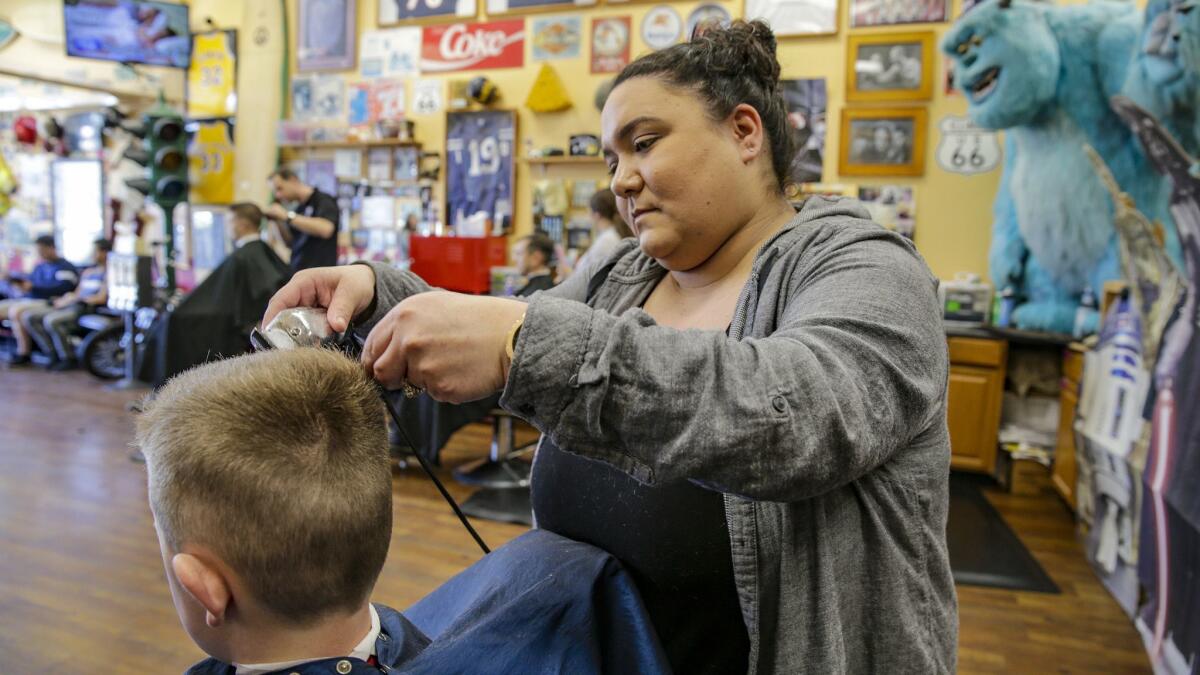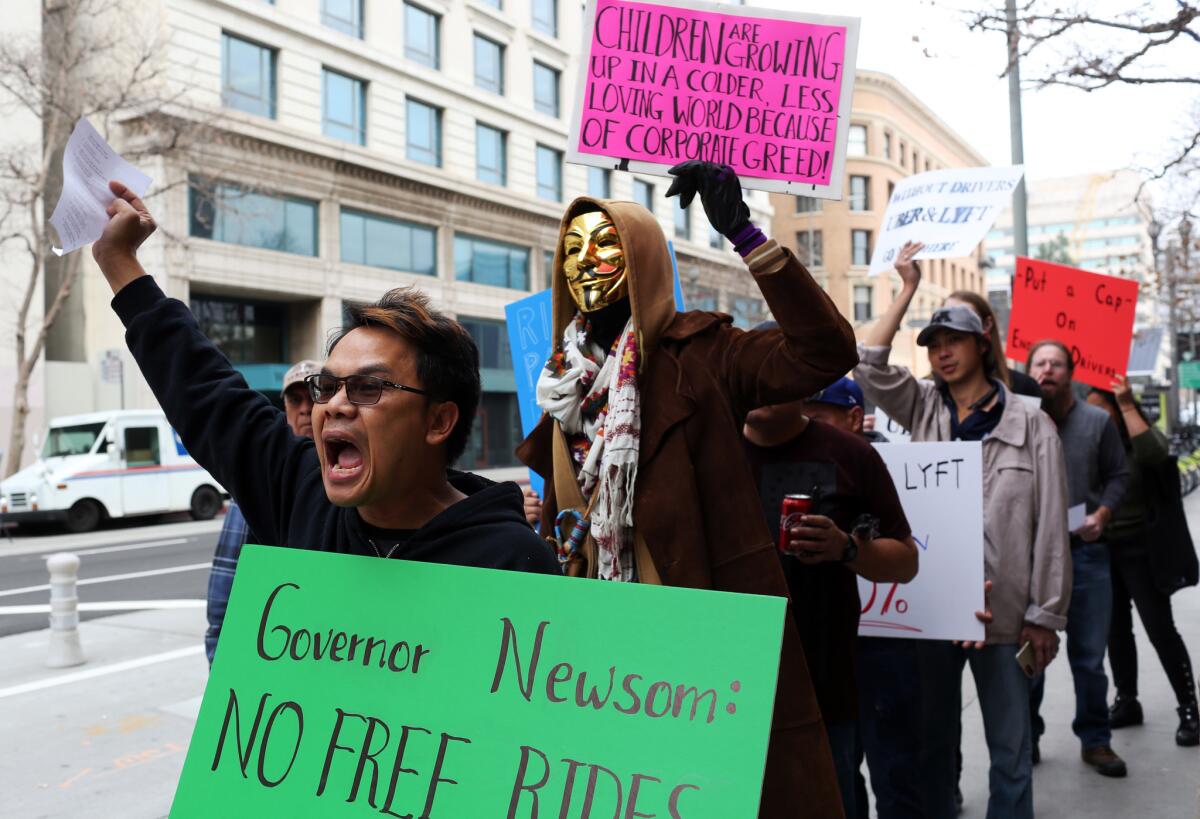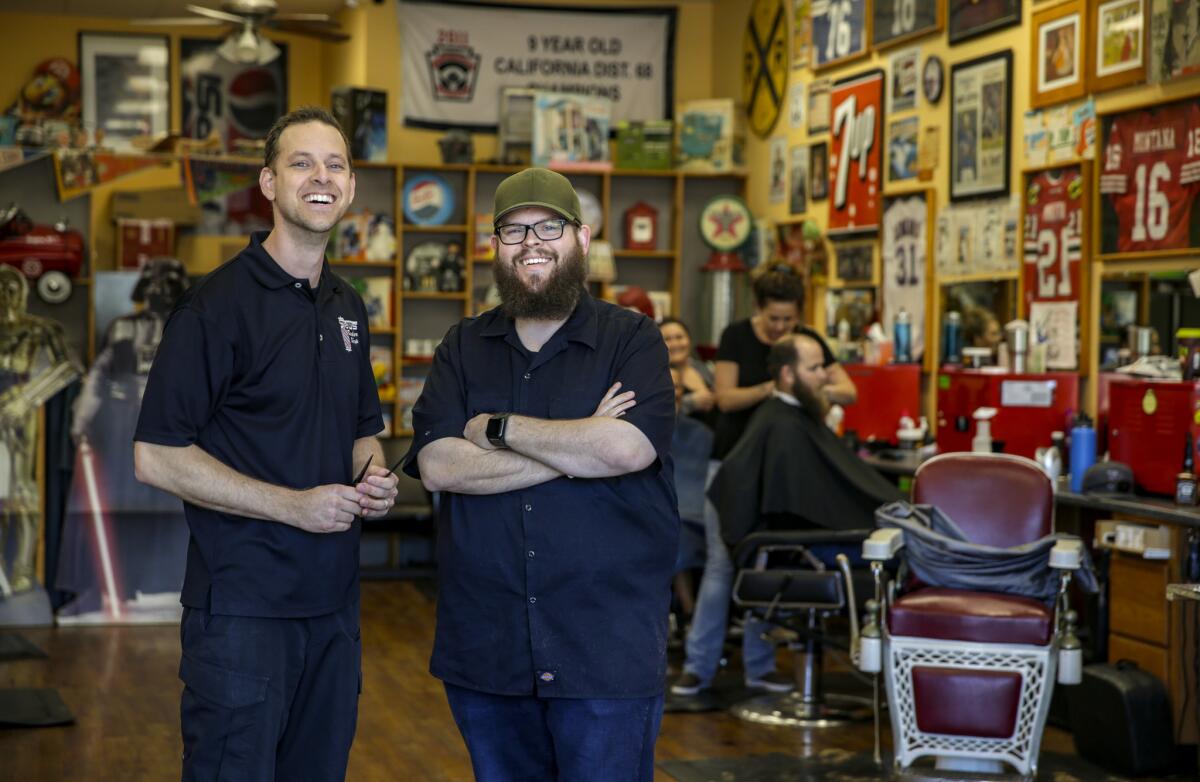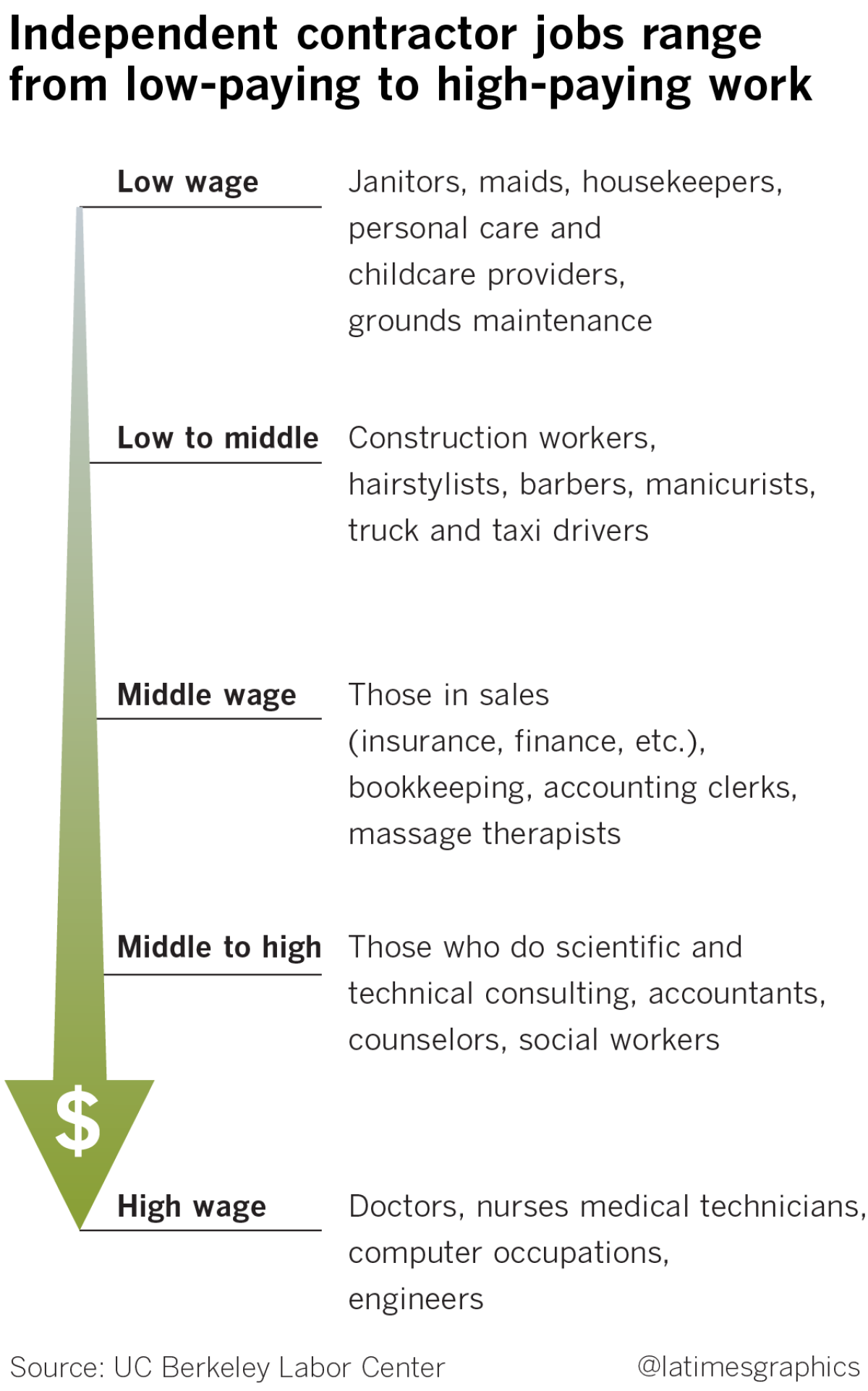Are you an employee or a contractor? Carpenters, strippers and dog walkers now face that question

- Share via
When Kristyn Hansen first took a job at Stews Barber Shop, she cut hair nine hours a day, three days a week. She earned no overtime pay, had no mandated breaks, and her Ladera Ranch bosses didn’t cover Social Security taxes, unemployment or disability insurance.
That’s because Hansen, 32, was classified as an independent contractor. “I loved it,” she recalls. The schedule allowed her to take five classes at a local college. The pay — a 60% share of an $18 haircut — made for “a comfortable living” serving about 30 clients in a day. Health insurance? That was covered by her husband’s employer.
But in October, the shop switched its seven barbers to employee status. To offset the expense of payroll taxes, sick leave, vacation and other benefits extended to the barbers, pay dropped to $15 an hour, with just a 15% share of the haircut price.
Now Hansen works four nine-hour days, taking home about $300 less weekly than when she worked just three days. “For some people, there are advantages to being an employee,” she said. “But not for me. I’m stressed for sure.”
A sweeping California Supreme Court decision last April is upending large and small workplaces across California, making it harder to classify workers as independent contractors. A broad swath of California industries are affected — not just app-based companies such as Uber and Lyft.
Independent contractors are found among construction workers, truckers and warehouse workers, music teachers, software coders and sales associates, farm laborers, janitors, dog walkers, hairdressers, home-care workers, security guards, doctors, insurance agents, journalists and even strippers.

Each sector may have workers who want to remain contractors, collecting untaxed wages upfront without deductions for benefits, and having control over their hours. And it may include others who prefer to be employees, with unemployment insurance, greater job stability and the right to join unions.
But the court set a strict new test: It assumes anyone is an employee if his or her job is central to a company’s core business or if the bosses direct the way the work is done. The verdict came in a lawsuit by drivers for Dynamex Operations West, a national package delivery company that reclassified its employees as contractors, forcing them to use their own vehicles and pay gas and other expenses.
A stricter standard, the court wrote, should prevent businesses from evading “fundamental responsibilities” and engaging in a “‘race to the bottom’ …result[ing] in substandard wages and unhealthy conditions for workers.”
In the California Legislature, the issue is shaping up as one of the most divisive of the year.
The California Labor Federation and worker advocates are seeking to write the court’s decision into permanent law, arguing that workers are often exploited when classified as contractors.
The California Chamber of Commerce, business groups and Silicon Valley giants, seeking flexibility in how they hire, want Dynamex to be suspended, they wrote the Legislature, “before work opportunities are destroyed, and before the trial lawyers start crushing businesses with an onslaught of litigation.”
Among businesses, “there’s a lot of fear,” said Assemblywoman Lorena Gonzalez (D-San Diego), who is authoring Assembly Bill 5 to codify the court’s new standard. “Everybody is lobbying for an exemption.”
Gov. Gavin Newsom, who has strong ties to both labor and the technology industry, suggests a need for compromise. “Workers are too often displaced, devalued and disconnected from the social safety net,” he said in his State of the State address this month. “It’s time to develop a new modern compact for California’s changing workforce. This is much bigger than Dynamex.”
The court’s new test, modeled on a Massachusetts law, strikes at the heart of a fundamental transformation in the U.S. labor force over the last half-century. Many companies have shifted large swaths of their workforces to independent contractor status or to staffing agencies, which offer no job security.
The trend cuts labor costs, thus boosting profits. This “fissured workplace,” as experts call it, has driven down union membership — by law, independent contractors cannot bargain collectively — and contributed to a loss of middle-wage jobs and wider inequality between workers and bosses.
By 2016, full-time independent contractors constituted 8.5% of California’s workforce, according to estimates in UC Berkeley Labor Center’s in-depth survey of available data. A somewhat higher percentage uses independent contracting for supplemental income, the study suggested.
A ‘gig economy’ built on contractors
Companies built around smartphone apps have embraced the independent contractor model, fueling a multibillion-dollar “gig economy.”
But Uber, Lyft, Amazon, Doordash, Grubhub and others are grappling with lawsuits by thousands of workers who say they are misclassified as independent contractors — angry to be exempted from laws governing wages and hours, discrimination, sexual harassment, disability pay and other labor protections.
Wag Labs, a Los Angeles company that offers dog walking through a mobile app, agreed to pay $1.05 million last November to settle a class-action suit on behalf of 38,000 independent contractors who said they were misclassified and forced to work off the clock.
We are disposable people.
— Francine Ayala, ride-share driver

Last month, more than 60 Uber and Lyft drivers marched in front of Newsom’s Los Angeles office hoisting hand-lettered signs decrying “Big Tech” and “corporate greed.” The protesters, members of Rideshare Drivers United-LA, a group of 2,500 local drivers, complained about slashed pay, arbitrary terminations known as “deactivations,” and a lack of input on working conditions.
“We are disposable people,” said Francine Ayala, a 40-year-old driver carrying a sign reading, “We want rights and protections.” A single mother, she said she can’t make ends meet after car payments, gas and insurance — business expenses that she wouldn’t have to pay if she were an employee. “If they’re not going to pay us well, they should give us benefits and protection.”
Uber spokesman Davis White declined to comment on lawsuits by drivers. In the past, the company has asserted that it is not in the transportation business — a definition that could make it vulnerable to the Dynamex test — but is merely a technology firm that connects riders to drivers. Other app-based businesses offer similar rationales.
Despite the Dynamex decision, “we believe drivers are independent contractors,” White wrote in an email. “We will continue to support efforts to modernize labor laws in ways that preserve the flexibility drivers tell us they value while improving the quality and security of independent work.”
Decades of conflict
But disputes over employee classification are not new. The high court’s strict test replaces a looser standard that had been used to challenge companies’ independent contractor status since 1989.
Trucking companies, for example, have faced lawsuits for years for relying on independent contractors. Both the California Trucking Assn. and the Western States Trucking Assn. have filed suits to overturn Dynamex. Like the Dynamex drivers found to be illegally classified, truckers often must pay for their own vehicles, gas and expenses.

In Southern California, drivers at the ports of Los Angeles and Long Beach have filed multiple class-action suits. And since 2011, the California labor commissioner has ordered port companies to pay more than $50 million in back wages and damages to drivers misclassified as independent contractors.
A lobbying onslaught
As the Legislature gears up for a fight, companies are enlisting workers to oppose codifying Dynamex. Already, businesses have unleashed more than 6,000 emails and held dozens of meetings with elected officials and their staffs, although the precise language of the bill is not expected to be unveiled until next month.
A chamber-sponsored website, the “I’m Independent Coalition,” offers contractors a form letter urging elected officials to “help protect my freedom.” DoorDash, the food delivery giant, emailed all its “dashers” to write legislators to “suspend the court decision and embrace the modern workforce.”
But Gonzalez, who is writing the Dynamex bill, counters, “If employers don’t pay their fair share, the cost falls on taxpayers. People without unemployment insurance often rely on food stamps or [welfare]. People without health insurance go to emergency rooms.”
Under the 2010 healthcare law, often called Obamacare, companies with more than 50 full-time employees must provide health benefits or pay a penalty. Small businesses are exempt, though some do offer health insurance; Stews Barber Shop now has an “opt-in” plan.

Deja Vu Services, a national strip club chain, has hired Stormy Daniels, the stripper who was paid off by President Trump’s lawyer over an alleged sexual encounter, to promote independent contracting. “Sadly, independent contractor status for exotic dancers in California is now threatened,” Daniels wrote in a Los Angeles Times op-ed piece.
If they are classified as employees, she suggested, “employers might require us to give free nude performances for customers we don’t feel comfortable with.”
Deja Vu is battling class-action suits involving more than 5,800 dancers at 25 California clubs who say they were misclassified as independent contractors.
In November, the company switched its California strippers to employee status, posting a sign in the clubs blaming the lawsuits and “a court order.”
The company is now paying them minimum wage, setting quotas for selling drinks and dances, and slashing their cash commissions to offset the cost of payroll taxes. Some 1,500 strippers have quit to work out of state or “under the table” at noncompliant competitors, according to operations director Ryan Carlson.
“The clubs are punishing us for exercising our rights,” said a former Deja Vu stripper who goes by the stage name Domino Rey. She and several fellow workers have formed an advocacy group, Soldiers of Pole, to “help us unionize to protect the most vulnerable in the industry and do away with rampant wage theft.”
Contractors in the arts and tech
In the heavily unionized mainstream entertainment industry, Dynamex is unlikely to have much impact. Behind-the-scenes crafts workers, from motion picture animators to theater ushers, are largely classified as employees, although many work intermittent gigs. The International Alliance of Theatrical Stage Employees, Moving Picture Technicians, Artists and Allied Crafts (IATSE) represents 140,000 workers in theater, motion picture and television, trade shows, exhibitions and concerts as well as the equipment and construction shops that support the industry.
But some small arts-related businesses are alarmed. Nathan Pangrazio, founder of the Angeles Academy of Music in Westwood, uses 20 independent contractors to teach piano, voice, violin, guitar and cello. “We are biting the bullet,” he said. “We’re switching them to being employees, but it is keeping me up at night.”
With 200 pupils, the school has a 10% profit margin. “This could take us to almost zero margin,” Pangrazio said. “I don’t want to lower anyone’s pay. But it will force us to hire new people at lower rates.”
“Probably there are enough businesses exploiting people that we need to have a strong law,” he added. “But our teachers like having flexible schedules and working for themselves. And this does hurt people like me who are fair and ethical.”

In the technology industry, large companies such as Google, Amazon and Facebook hire hundreds of contractors. Their trade group, the Internet Assn., along with TechNet, a network of top executives, and companies such as Postmates, Lyft and Instacart are among the most active opponents of curbing the use of contractors.
But small tech companies, less able to weather the change, are likely to be vocal too.
“Switching my independent contractors to salaried employees would be crippling,” said Dave Krause, founder of Rise-Up Technologies, a Studio City IT services firm with just three employees. Rise-Up helps small and medium-sized businesses with networks and infrastructure, using dozens of outside engineers on projects that may last just a week, or even a single day.
“Everyone is a specialist,” Krause said. “Some in certain software applications; some in distributed databases; others in certain types of hardware; some do security on certain networks. They make between $30 and $150 an hour. I can’t pay taxes and benefits on top of that. Some work for multiple companies. It makes no sense for them to be my employees.”
In Sacramento, negotiations are in high gear. “A lot of businesses are waiting to see what happens legislatively,” Gonzalez said.
The Dynamex decision explicitly allowed for independent contractors, such as electricians or plumbers who run their own businesses, to be hired by unrelated companies. And Gonzalez said other exemptions may make sense, for emergency room doctors, for example.
“There are workers out there who operate as individual businesses — and we are not trying to make them employees,” she said. “But we’ve created an economy where people have to have multiple side hustles. It is not sustainable.”
A strong law is needed “to rid our state of the underground economy, which goes hand in hand with misclassification,” she added. “Workers need access to a minimum wage and overtime, to sick leave and paid family leave, to unemployment insurance and workers’ comp, to Social Security when they retire.”
Mark Hylkema, co-owner of Stews Barber Shop, is unconvinced. “Small businesses are scared,” he said. “My operating costs rose 30% and I had to raise my prices. We need to hit ‘pause’ in Sacramento.”
Twitter: @margotroosevelt
More to Read
Inside the business of entertainment
The Wide Shot brings you news, analysis and insights on everything from streaming wars to production — and what it all means for the future.
You may occasionally receive promotional content from the Los Angeles Times.











